Curriculum
/prod01/channel_2/media/mccms/content-assets/academics/residencies-and-fellowships/physical-medicine-and-rehabilitation-residency-fl/curriculum/physical-medicine-rehabilitation-residency-fl-1024X512-legrandphoto-22-2445.jpg)
Clinical training
The Physical Medicine and Rehabilitation (PM&R) Residency at Mayo Clinic's campus in Jacksonville, Florida, in collaboration with Brooks Rehabilitation Hospital, features 31 four-week blocks of required rotations in six broad areas (including inpatient rehabilitation, outpatient musculoskeletal and neurologic rehabilitation, electromyography, pediatric rehabilitation, and hospital consultation services), three (four-week) blocks of electives or research activities, and one block each of an inpatient and outpatient selective rotation, which is an opportunity to repeat one of the prior rotations on the inpatient and outpatient services.
To further enhance your training experience, you have the option to use elective time to rotate in other clinics at Mayo Clinic in Jacksonville, Florida, or at the other Mayo Clinic sites, including Mayo Clinic campuses in Rochester, Minnesota; Phoenix/Scottsdale, Arizona; Mayo Clinic Health System in Minnesota and Wisconsin; or Mayo Clinic Square Sports Medicine in Minneapolis, Minnesota.
Your training includes a continuity clinic during the last two years. During all three years, you may also choose to serve as a team physician for a local sports team.
Year 1 (PGY-1)
Preliminary Year – Internal Medicine
Internal Medicine Preliminary Residency (Florida) website
| Rotation | Length |
|---|---|
| Inpatient Medicine | 10-12 weeks |
| Inpatient Cardiology | 4 weeks |
| Night Medicine | 4-6 weeks |
| Intensive Care Unit | 4 weeks |
| Emergency Department | 4 weeks |
| Ambulatory | 8-9 weeks |
| Electives | 2-5 weeks |
| Radiology | 2 weeks |
| Neurology | 4 weeks |
| Rheumatology | 2 weeks |
| PM&R | 4 weeks |
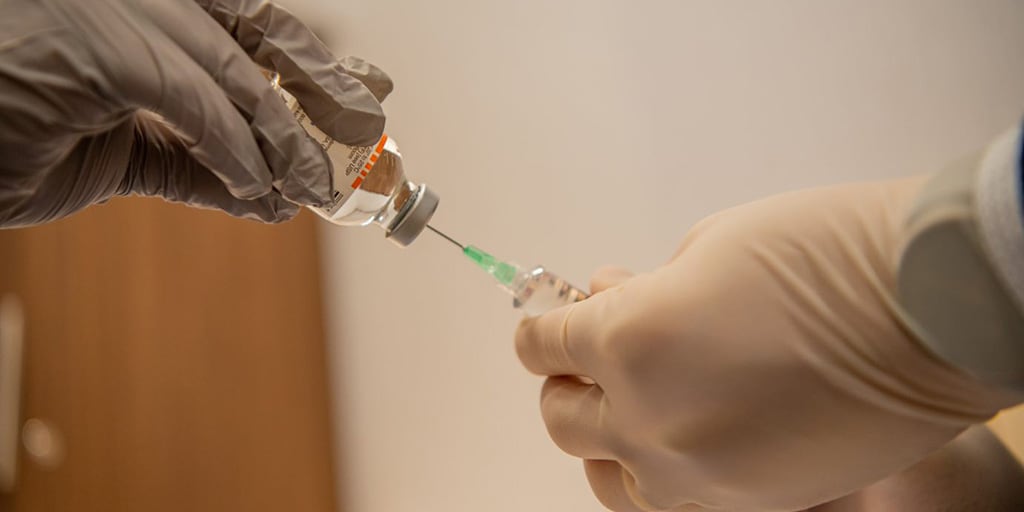
(Photo provided by Michael LeGrand.)
Year 2 (PGY-2)
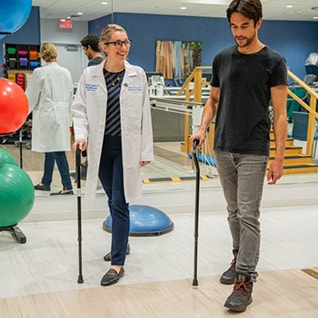 The second year is split between seven four-week blocks on the inpatient rehabilitation service at Brooks Rehabilitation Hospital - University Avenue Campus, five four-week blocks rotating through various outpatient clinics at Mayo Clinic Florida, and four weeks of research or elective time.
The second year is split between seven four-week blocks on the inpatient rehabilitation service at Brooks Rehabilitation Hospital - University Avenue Campus, five four-week blocks rotating through various outpatient clinics at Mayo Clinic Florida, and four weeks of research or elective time.
Inpatient rotations are divided between two four-week blocks each on the spinal cord, stroke, and brain rehabilitation teams, and one four-week block on the pediatric rehabilitation unit.
Outpatient rotations include one four-week rotation in the general PM&R clinic, cancer rehabilitation clinic, neurology clinic, musculoskeletal/sports clinic, musculoskeletal/ultrasound clinic, and pain medicine clinic.
(Photo provided by Michael LeGrand.)
Year 3 (PGY-3)
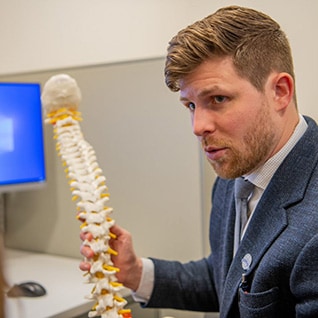 You will start the year with four four-week blocks in the Neurophysiology lab at MCF doing electromyography training, with the remainder of the year split between inpatient and outpatient services.
You will start the year with four four-week blocks in the Neurophysiology lab at MCF doing electromyography training, with the remainder of the year split between inpatient and outpatient services.
Rotations in the outpatient setting include musculoskeletal/sports medicine, musculoskeletal/ultrasound, rheumatology, and spine management, plus one four-week block of research/elective time.
There will be one four-week rotation on the acute hospital consultation service at MCF, and three additional four-week rotations at Brooks Rehabilitation Hospital.
You also begin your continuity clinic this year for one half-day each week when rotating in the outpatient clinics.
(Photo provided by Michael LeGrand.)
Year 4 (PGY-4)
During your senior year, you return to the inpatient rehabilitation service for two (four-week) blocks.
Other required rotations include outpatient neurology and pediatrics rehabilitation clinics, additional musculoskeletal, ultrasound, and spine clinics, as well as two additional four-week blocks on the EMG service and one four-week block on the inpatient consult service.
You will also have the opportunity for elective and selective outpatient rotations in various subspecialties at MCF or the other Mayo Clinic campuses.
Rotation descriptions
Inpatient rehabilitation services
Your inpatient rehabilitation rotations will occur at Brooks Rehabilitation Hospital, primarily the University Avenue campus. This is a 170-bed free- standing rehabilitation hospital in the central area of Jacksonville, Florida. During these rotations, you work side by side with the PM&R staff physicians to provide primary medical care and to direct the patient’s rehabilitation care. There are general internal medicine hospitalists and some subspecialty consultants available to assist with the medical care of the patients. You will conduct patient care conferences weekly with the rehabilitation team, family conferences as needed, and lead clinical discussion groups along with the faculty. A typical patient load on the adult services is twelve to fourteen patients daily, and eight to ten patients on the pediatric service.
Residents assume an increasing level of practice independence as their experience and abilities dictate. Besides the resident-led “teaching service,” the PM&R faculty also have additional patients to manage and will do so in collaboration with Advanced Practice Providers (PAs or APRNs), who will also be available to assist you as needed. You will work closely with physical therapists, occupational therapists, speech language pathologists, clinical psychologists, and licensed social workers on the rehabilitation needs of your patients. Trained allied health personnel perform most ancillary procedures, such as starting intravenous fluids (including blood), performing venipunctures and electrocardiograms, and drawing blood gases. Residents have twelve four-week inpatient rotations throughout their program. The three main “teaching services” at Brooks Rehabilitation Hospital will be the:
- Spinal cord rehabilitation service
- Brain rehabilitation service
- Stroke rehabilitation service
For the spinal cord, stroke, and brain rehabilitation services, you will spend two four-week rotations on each service during the PGY-2 year, and one additional four-week rotation either during PGY-3 or PGY-4 year. During PGY-2 year you will also spend one four-week rotation on the pediatrics inpatient service. During PGY-3 or PGY-4 you will spend one four-week rotation on the general rehab service which includes patients undergoing inpatient rehabilitation following medical issues such as amputations, solid organ transplants, bone marrow transplants, cancer treatments, and other complex medical disorders. The twelfth rotation at Brooks Rehabilitation Hospital is called a selective and you may rotate for an additional four weeks on any of the services that you have previously been on or any of their other inpatient rehabilitation services, including the option to work at their newer Bartram Crossing facility/campus. You will have the choice to select this rotation. The Brooks Rehabilitation Hospital currently admits more than 2,716 patients a year.
During the times throughout the year that you rotate at Brooks Rehabilitation Hospital, there will always be at least one-two other PM&R residents rotating there at the same time rotating on different services, with the exception if you choose to do the selective at Bartram Crossing campus. Other than the pediatrics service, when you are doing an inpatient rotation, you will have one half day per week in the follow-up clinics for that service and once a month participation in the amputee clinic. There will be times throughout the week to work on hospital quality/safety committees and your Quality and/or research projects.
There will be one four-week required outpatient rotation at Brooks Rehabilitation Medical Group Outpatient Clinic during PGY-4 year for spasticity management.
Clinic Outpatient consultation services
Throughout each year of the program, you will spend multiple weeks on outpatient rotations, and see a wide variety of conditions. On the musculoskeletal rehabilitation side of training, you gain experience in the diagnosis, management and rehabilitation of acute and chronic musculoskeletal problems including sports injuries, arthritis and other degenerative problems, spine conditions, and sports rehabilitation. You develop diagnostic ultrasound skills and the ability to provide ultrasound guided peripheral injections. There is also an exposure to regenerative medicine pathways and procedures. There are progressing levels of clinical independence each year in musculoskeletal and spine management within the PM&R clinics and one four-week rotation in Pain Medicine during PGY-2 and a Rheumatology rotation during PGY-3.
Outpatient rotations will also include an early PGY-2 General Rehab rotation to expose the resident to all different populations of patients commonly seen in PM&R clinics, and an outpatient cancer rehabilitation rotation. There will be an outpatient neurology rotation to diagnose, treat and observe long-term outcomes for persons with cerebrovascular disorders, neuromuscular diseases, peripheral nerve injuries/disorders, and functional neurological disorders during PGY-4.
Electromyography Laboratory
You gain extensive experience in electromyography during six (four-week) block rotations in the Neurophysiology/Electromyography Laboratory at MCF. There are four rotations to start the PGY-3 year including a two-month neurophysiology course intertwined with performing the EMG studies. There are another two four-week rotations during PGY-4 to reinforce skills and allow you to perform enough electromyographic studies to qualify for certification by the American Board of Physical Medicine and Rehabilitation.
Pediatric rehabilitation services
Your residency includes eight weeks of pediatric rehabilitation services consisting of inpatient care during PGY-2, and outpatient care during PGY-4. You learn to assess and manage children with developmental disabilities and diseases, cerebral palsy, muscular dystrophy, spina bifida, and acquired disorders such as brain trauma and spinal cord injuries.
Hospital inpatient consultation services
While assigned to the acute hospital consultation services at MCF, you work with staff physiatrists to provide consultation services and regular follow-up for inpatients to assist with determination of their Post-Acute Care (PAC) and ongoing rehabilitation needs. Mayo Clinic Hospital has services for neurosurgery, neurology, cancer treatments including bone marrow transplant, solid organ transplants, peripheral vascular disease, and ICU patients with complex medical in neurological disorders.
Mayo campus rotations
Electives
Inpatient and outpatient elective rotations are available to meet your interests and career goals. Your options include electives in the Department of Physical Medicine and Rehabilitation or in other departments at MCF and may include Regenerative Medicine.
You may complete rotations at Mayo Clinic's campuses in Rochester, Minnesota, Phoenix/Scottsdale, Arizona, or the Health System in Minnesota or Wisconsin, during the PM&R Residency. These practices offer outpatient and inpatient PM&R experience in a variety of academic or community-based practices.
Mayo Clinic funds your authorized additional costs of travel, housing, automobile rental, and licensure fees.
Didactic training
Clinical conferences, seminars, small discussion groups, journal clubs, and one-on-one instruction are integral parts of the Mayo Clinic in Jacksonville, Florida, in collaboration with Brooks Rehabilitation Hospital PM&R Residency.
Your didactic training includes:
- Resident didactic sessions that focus on the diagnosis, treatment, and rehabilitation of disorders of bones, joints, nerves, and muscles on a weekly basis.
- This will include a comprehensive longitudinal training curriculum in musculoskeletal ultrasound for diagnostic and injection purposes.
- A comprehensive introductory PM&R curriculum and a research training curriculum during PGY-2 are necessary.
- Journal club, which meets once a month. You are assigned to review approximately one to two articles a year, but monthly journal club attendance is required.
- Clinical conferences and case presentations are presented by physical medicine and rehabilitation consultants, residents, students, or guest faculty on a biweekly basis.
- Weekly conferences in sports and inpatient rehabilitation services. Attendance is required while you are on these specific rotations, otherwise, attendance is optional.
- A comprehensive anatomy course with prosected cadavers paired with a musculoskeletal and ultrasound exam course providing hands-on training and observation of joint and spine examination skills. This begins during the PGY2 year and repeats throughout each year as needed.
- A two-month clinical neurophysiology course integrated into the electromyography rotation.
Residents present clinical case conferences and Journal Club articles to the department twice a year each year. An annual Resident Seminar Day provides a forum for presentation of the initial development of research project during PGY-2 year and for senior residents to present the findings/outcomes of their research.
Research training
The research training program includes planning a research project early in the PGY-2 year that you complete during your residency. Projects frequently involve musculoskeletal ultrasound, epidemiology of specific disorders, or new rehabilitation interventions. This experience improves your ability to think analytically and critically review literature. Research funding is available for approved projects.
During the residency, you prepare two seminar presentations that represent the introduction and results of your research project.
PM&R residents are encouraged to submit their research work for presentation at national meetings. If accepted, the department supports attendance at those meetings. In addition, each resident is offered one trip to attend a meeting of his or her choice as an educational and networking opportunity.
Clinician Investigator Training Program
The Clinician Investigator Training Program is available as part of the PM&R Residency. This opportunity would extend your training by approximately 18-24 months. The Clinician Investigator Training Program is an excellent choice if you are planning a career that would emphasize research in an academic center.
Call frequency
Your call schedule varies by individual rotation. Mayo Clinic follows duty hour recommendations of the Accreditation Council for Graduate Medical Education (ACGME). During PGY-1 year you will have either daytime or nighttime clinical activities, but there are no 24-hour shifts. During PGY-2 to PGY-4, the only call is during inpatient services at Brooks Rehabilitation Hospital. You will take telephone call from home one night per week and work one weekend day per rotation on each of the inpatient services.
Teaching opportunities
You have the opportunity to teach Mayo Clinic Alix School of Medicine students and visiting students from other medical schools through bedside instruction, outpatient clinic supervision, physical examination workshops, and formal didactic lectures. In addition, residents and fellows from other Mayo Clinic departments occasionally rotate through PM&R.
Practice board exams
To prepare for board examinations, you participate in the yearly self-assessment exam prepared by the American Academy of Physical Medicine and Rehabilitation. You may also complete mock oral exams twice each year, conducted by Mayo Clinic's PM&R faculty. These oral exams prepare you for the second part of the physical medicine and rehabilitation boards.
Committee assignments
We feel that committee participation is an effective way to promote professional development. Residents participate on committees at Mayo Clinic Hospital during outpatient rotations, at Brooks Rehabilitation Hospital during inpatient rotations, and within national organizations as opportunities present.
Moonlighting
Moonlighting is permitted for licensed residents at the PGY-3 level or above with prior approval from the Program Director. Moonlighting activities may be scheduled during times when you are assigned to consultative or outpatient rotations on the PM&R services, as long as they do not interfere with your clinical, didactic, or research-related duties. No moonlighting is allowed while you are assigned to inpatient rotations or on rotations in other departments unless the residents in that department are allowed to moonlight.
Evaluation
The Physical Medicine and Rehabilitation Residency at Mayo Clinic in Jacksonville, Florida, is committed to following the guiding principles as put forth by the ACGME Outcome Project. Residents should expect to be evaluated for progress toward achieving competency in these areas:
- Medical knowledge
- Patient care
- Professionalism
- Practice-based learning and improvement
- Communication skills
- System-based practice
The Clinical Competency Committee and the Program Director review the resident’s progress in the areas above and PM&R Milestones for training. There is an expectation that each resident will develop more independence with rotations during each year.
Each year one resident will participate in the Program Evaluation Committee meeting to evaluate the program. All residents are required to evaluate the program confidentially through the ACGME.
Resident life
Mayo Clinic in Jacksonville, Florida, Physical Medicine and Rehabilitation Residency program in collaboration with Brooks Rehabilitation Hospital supports you both inside and outside of campus and ensures your work/life balance. As a resident, your physical and mental health is a priority to both Mayo Clinic and our department. Learn about what Mayo Clinic and Jacksonville, Florida, have to offer.
- Fitness centers
- Groups on campus
- Well-being
Fitness centers
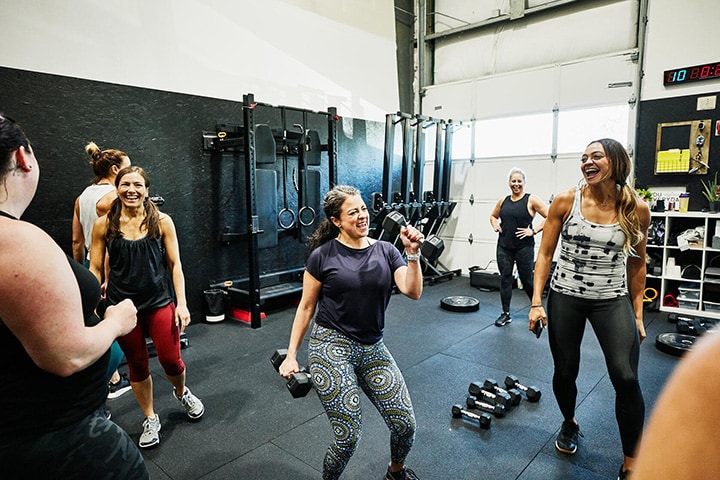 Mayo Clinic residents or fellows can experience 24/7 free access to the Bill Hewitt Employee Wellness Center — opened in the summer of 2024 and spans 6,700 square feet with modern cardio machines, weight machines, free weights, a studio for live classes, and includes showers and locker rooms for convenience.
Mayo Clinic residents or fellows can experience 24/7 free access to the Bill Hewitt Employee Wellness Center — opened in the summer of 2024 and spans 6,700 square feet with modern cardio machines, weight machines, free weights, a studio for live classes, and includes showers and locker rooms for convenience.
Additionally, residents or fellows at our three campuses get discounted membership fees to area gyms. In Jacksonville, Florida, residents and fellows can obtain an exclusive discount with the YMCA (several locations).
Groups on campus
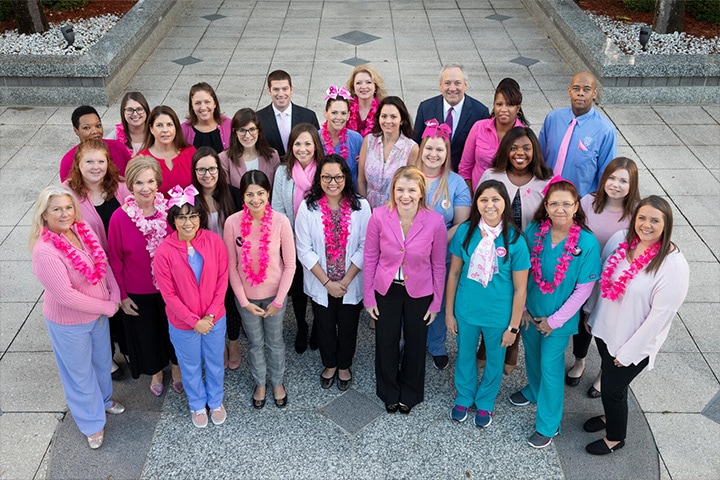
Opportunities to join a variety of groups on campus provide regular social activities and can help enhance your training while connecting with a broad group of peers.
Trainees will have the opportunity to join a Mayo Employee Resource Group (MERG) at any time during their training program. Mayo Employee Resource Groups (MERGs) are employee-led affinity groups to promote belonging, increase cultural awareness, and foster an environment of respect and inclusivity. Any Mayo Clinic employee can join a group of interest and choose their level of involvement
Well-being
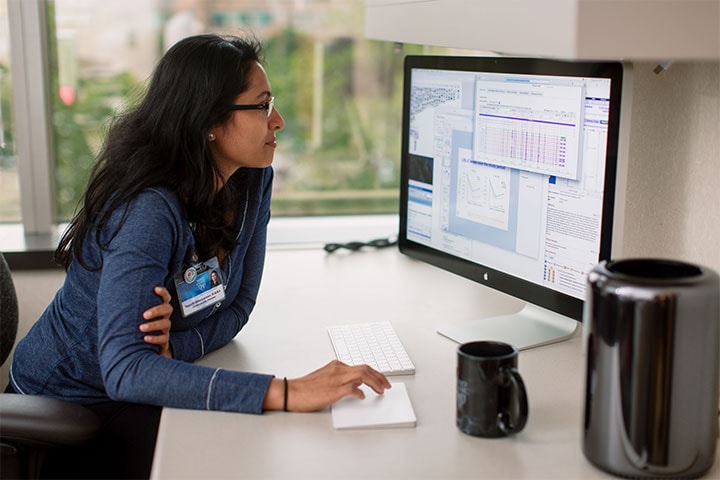 The Office of Academic Support and Well-Being provides resources to promote academic, emotional, social, cognitive, financial, and physical well-being. Career and academic services include academic advising, peer tutoring, and accommodations for learners with disabilities or health conditions. Mental health services, counseling, interview practice, and a variety of enrichment sessions on topics like budgeting, resiliency, and stress and burn-out are also available through the Academic Support and Well-Being office.
The Office of Academic Support and Well-Being provides resources to promote academic, emotional, social, cognitive, financial, and physical well-being. Career and academic services include academic advising, peer tutoring, and accommodations for learners with disabilities or health conditions. Mental health services, counseling, interview practice, and a variety of enrichment sessions on topics like budgeting, resiliency, and stress and burn-out are also available through the Academic Support and Well-Being office.
Outside of work, you can enjoy a variety of activities on the land, in the water, and during days of sunshine. Here are just a few recommended activities.
Living in Jacksonville
Beach - Enjoy surfing, surf fishing, swimming, paddle boarding, beach volleyball, and more!
Water activities - Jacksonville is a great city for anything related to water. Beyond the beach, there are many miles of shoreline on the St John’s River and Intracoastal Waterway. Kayaking and fishing are very popular.
Sports - There are plenty of recreational leagues and organized pick-up games in several sports including soccer, basketball, and beach volleyball. Residents also enjoy watching the Jumbo Shrimp, Jacksonville's minor league baseball team, and the Icemen, a minor league hockey team.
Concerts - The St Augustine Amphitheater and Veterans Memorial Arena consistently bring in great shows and concerts.
Day/weekend trips - Take trips to Springs in central Florida, St. Augustine, Orlando/Disney World, Savannah, Georgia, and Charleston, South Carolina.
Food/drink - Jacksonville has several excellent breweries and a newly established distillery. There are also well-known distilleries and breweries in St. Augustine and Fernandina Beach (a 40-minute drive). There are restaurants covering cuisine from all over the world and from grab-and-go to high-end. Seafood is prominent on most menus, and much of it is locally sourced.
Nightlife - There are many great restaurants and bars around town, with some very active spots by the beaches, San Marco, Riverside, and downtown. Each has a different atmosphere so there’s something for everyone.
Nature - Florida has a great state park system with several of them close to Jacksonville. There are plenty of city and county parks as well. Jacksonville is located between two national park sites, the Timucuan Preserve and the Guana-Tolomato-Matanzas National Estuarine Research Reserve. Timucuan offers a huge area for kayaking and other watercraft activities and GTMNERR offers over eight miles of undeveloped shoreline on the Atlantic where you can completely escape the crowds. During the week, it’s possible to go there and share two miles of beach with only three to four people.